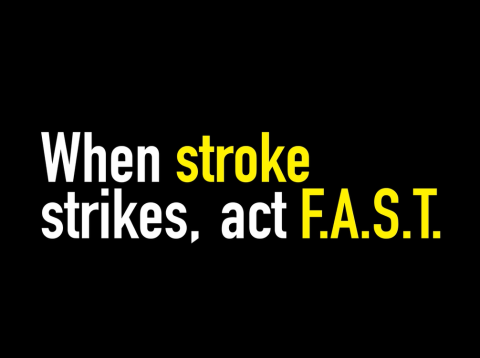Think FAST if you suspect a stroke!

Strokes claim the lives of around 1,000 people each year in Northern Ireland. Ahead of World Stroke Day on Wednesday 29 October, the Public Health Agency (PHA) is reminding people to ‘think FAST’ if they suspect someone is having a stroke.
Dr Joanne McClean, Director of Public Health at the PHA, said: “Stroke is an attack on the brain. It happens when the blood supply to a part of the brain is cut off and brain cells are damaged or die. Stroke is a common cause of death and disability in Northern Ireland with approximately 2,800 new strokes here every year. While the majority of strokes occur in people over the age of 65, it can strike at any age, with 25% occurring in people under the age of 65.
“In order to reduce your chances of having a stroke it is important to the risks factors associated with having a stroke and take action to help prevent it happening.”
You can reduce your risk of having a stroke by:
- knowing and managing your personal risk factors such as high blood pressure, diabetes, atrial fibrillation (irregular heart beat) and high blood cholesterol;
- exercising regularly and maintaining a healthy weight;
- reducing alcohol consumption;
- stopping smoking.
Dr McClean added: “However, if the worst does happen and someone has a stroke, knowing the signs and symptoms and acting FAST can improve the chances of survival and reduce the level of disability that results from a stroke.”
The FAST campaign raises public awareness of the signs and symptoms of stroke, and highlights actions to take if you think someone is having one, in an easy to remember way:
- Face – Has their face fallen on one side? Can they smile?
- Arms – Can they raise both arms and keep them there?
- Speech – Is their speech slurred?
- Time – Time to call 999 if you see any single one of these signs.
“Stroke is still one of the biggest causes of death and disability in Northern Ireland. It is important that everyone knows and manages their risk factors for stroke, so that we can prevent strokes happening. It is also essential that we recognise the signs of stroke and take appropriate action FAST.
“A stroke is a medical emergency that requires immediate medical attention, so recognising any sign of stroke and calling 999 for an ambulance is crucial. The sooner somebody who is having a stroke gets urgent medical attention, the better their chances of a good recovery,” concluded Dr McClean.
